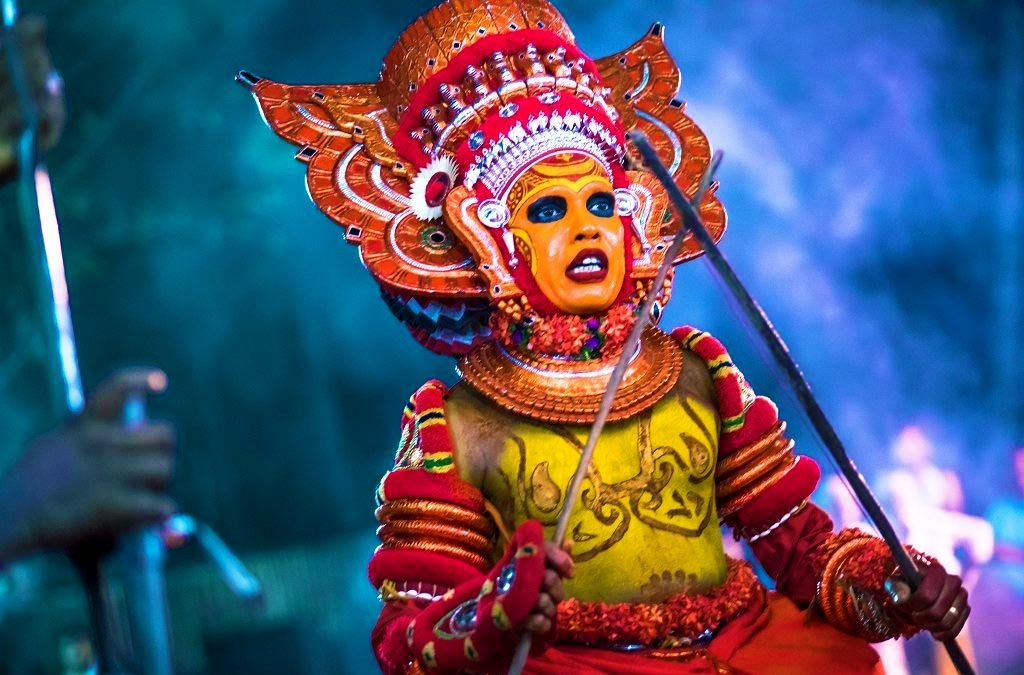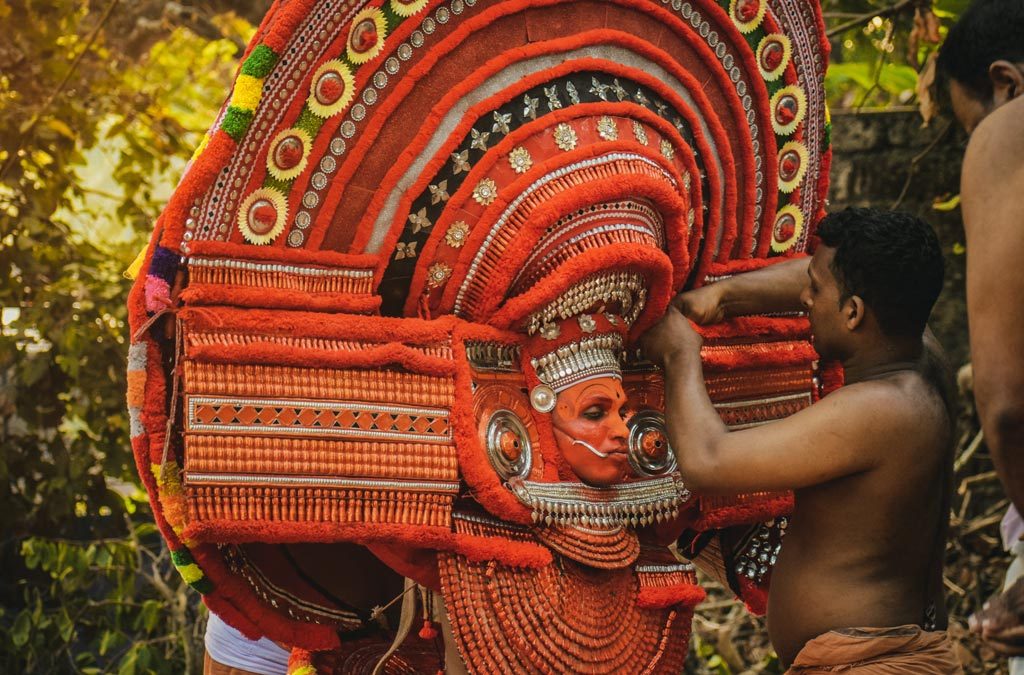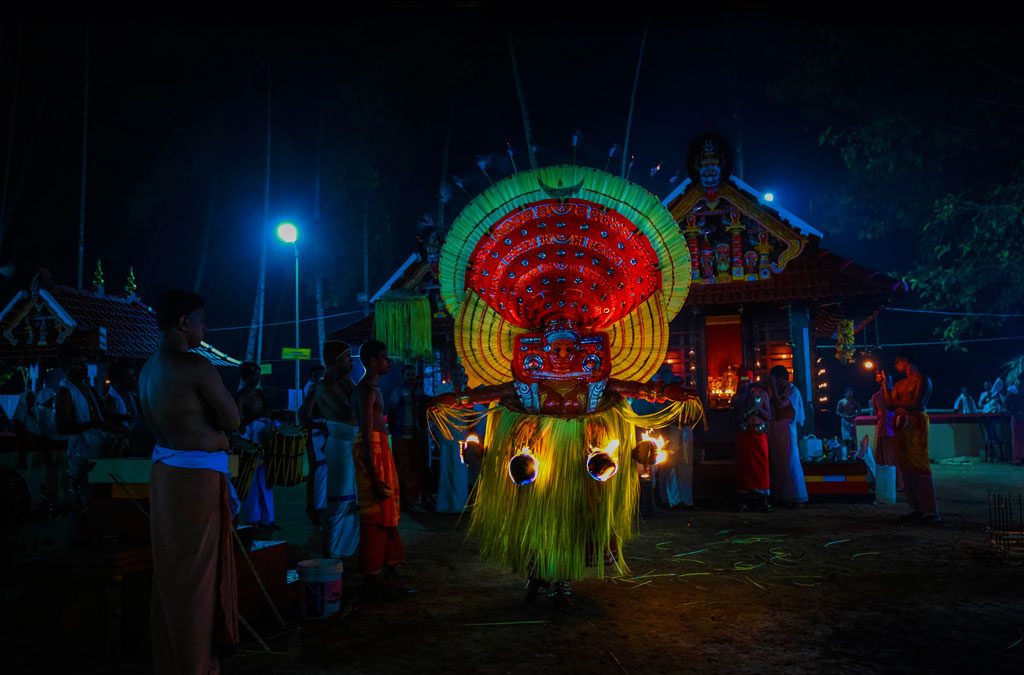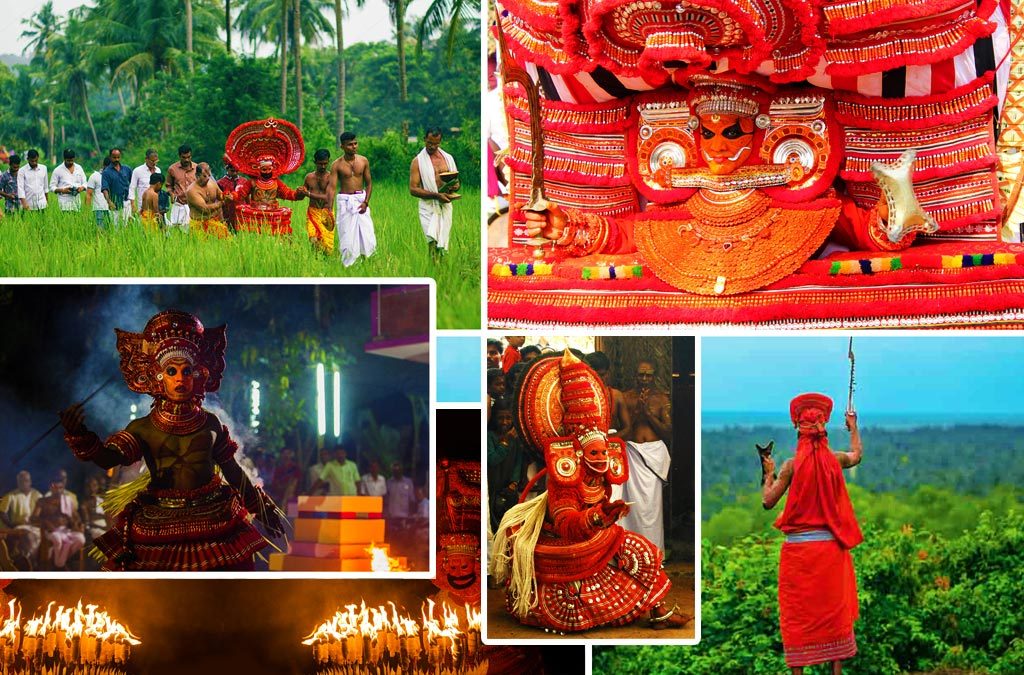
The blissful state of Kerala has a greater wealth of cultural traditions than any other part of the country. And the state celebrates its vibrant culture and traditions through an array of fairs and festivals. Kerala’s rich and dynamic festivals are immensely popular at the same time appealing to tourists all across the world. The traditional festivals of Kerala bring forward ancient myths that speak of gods, goddesses, saints, heroes and demons who once walked through this incredible land.
One of the most special and extraordinary festivals one can witness in Kerala is none other than Theyyam, the religious and ritualistic dance-drama originated in Malabar, the northern belt of Kerala. Theyyam season has already begun in North Kerala to feast your ears with the hypnotic chants and rhythmic drumbeats as well as your eyes with the colourful pageantry and vigorous dance moves. The pomp and rigor of Theyyam continue till March.

Also Read:- Best Trekking Places To Visit In Kerala
Kerala Tourism Holiday offering you an enriching experience of exploring its culture, tradition and unique festivals and art forms.
If you happen to visit North Malabar regions like Kannur, Kasaragod, and parts of Wayanad and Kozhikode districts between November to March, you will get a chance to witness the most colourful and ritualist festival of Theyyam.
Read On To Know More About Theyyam Festival:
Theyyam is a sacred ritual art form that dates back to at least 1,500 years and is usually performed before the village shrine, groves, and in some joint-family houses as ancestor-worship with elaborate rites and rituals. The word Theyyam literally means ‘God‘ and hence the Theyyam dance is known as the ‘Dance of Gods‘. This unique dance form is a synthesis of ritual, dance, vocal and instrumental music, painting, sculpture and also literature and is performed to worship Hindu Goddess Kali for which it is also known as ‘Kaliyattam‘. The Theyyam dance is often performed by men, mostly from the scheduled castes and tribes who have inherited the right to perform Theyyam.

Theyyam has its roots in the ancient Dravidian culture of South India and therefore it is a part of the ancient tribal culture of Kerala where tribal animism was once the most common form of worship. Hence, in Theyyam rituals, trees, plants, and animals are worshipped along with Hindu gods. When the dancers are costumed as Theyyam, the spirit of the deity is conceptually transferred to the artist and they are considered as God by the devotees to whom they seek blessings. Theyyam are not only capable of blessing the devotees, but also cure their illness and give solutions to their problems. Some rituals in Theyyam performance involves dancers walking on hot coal, the sacrifice of a rooster, etc.
Highlights of Theyyam
The colourful costumes and exotic make-up are the main highlights of Theyyam. The Theyyam performer is called ‘Kolam’ who represents a divine, mythological, or heroic character. Theyyam is often performed by men and they themselves enact the female roles also by wearing elaborate make-up and costumes. The facial makeup is so intricate that the artist has to lie on the floor for hours while the designs are painted on their faces.

Also Read:- Traditional Art Forms Of Kerala
The most sacred part of the costume is the headgear which is made from tender coconut leaves. The facial makeup and the headgear vary from character to character. The crown (muti) is made from bamboo splices and wooden planks which are covered with colour cloths, coconut leaves and flowers. Arm ornaments, breastplates, bangles, garland and other body decorations are also used in Theyyam.
What Do You Experience?
Theyyam is unique, powerful and a divine splendour to watch. the Theyyam performance begins with Vellattam or Thottam. It is performed with only a small red headdress and no proper make-up or any decorative costume is used during this occasion. Then the dancers are accompanied by drummers and they recite a particular ritual song, which describes the myths and legends of how the deity of the shrine came to be honored. Folk musical instruments are also used at this time. The dancer returns to the green room, after finishing this primary ritualistic part of the chant.

Also Read:- Mysterious and Strange Temples in Kerala
After a short interval, the dancer makes a ritual entrance into the shrine with elaborate costumes and makeup. Then he is seated before the shrine and the headdress, which is the most sacred part of the costume is put on and he gradually transforms into the particular deity of the shrine. Until the headdress is removed, he is considered as divine. The Theyyam runs all around the shrine and its courtyard, dancing and performing rituals and blessing the devotees. At last, the dancer distributes turmeric powder as a symbol of blessing and also throws rice on the audience.
Popular Places To Witness Theyyam Performance
Theyyam Festival is mainly held in the North Malabar regions of Kerala. It is performed every day at Parassini Kadavu Sri Muthappan Temple in Kannur. Muchilot Bhagavathi Temple, Kannur; Pulimuthappan Kavu, Kannur, Sree Mavilaakkavu Temple, Kannur; Mallom Kollom Temple, Kasaragod, Kuttikkol Thampuratti Bhagavathy Temple, Kasaragod; Perumthitta, Kasaragod; Kanathoor Nalvar Bhoothasthanam, Kasaragod; etc are the popular places where Theyyam Festival is held.
Most Popular Theyyams

Also Read:- Exploring the Top Bird Sanctuaries in Kerala: A Paradise for Birdwatchers
There are more than 400 various kinds of Theyyams performed in Kerala. The most famous ones are Sree Muthappan Theyyam, Gulikan Theyyam, Padikuttiyamma, Puthiya Bhagavathi Theyyam, Perum Kaliyattam, Manakott Amma, Kuttichathan Theyyam, Muchilot Bhagavathi, etc.
Plan a trip to Kerala now and never miss the chance to feast your eyes with the divine splendour of Theyyam performance and fill your soul with divinity.
We, the team of Kerala Tourism Holiday are all set to offer you a perfect Kerala Culture Tour Package through the widest range of value-added services in the Tourism Industry.
Enquire now and get the best deals and offers
Feel free to visit www.keralatourism.holiday
